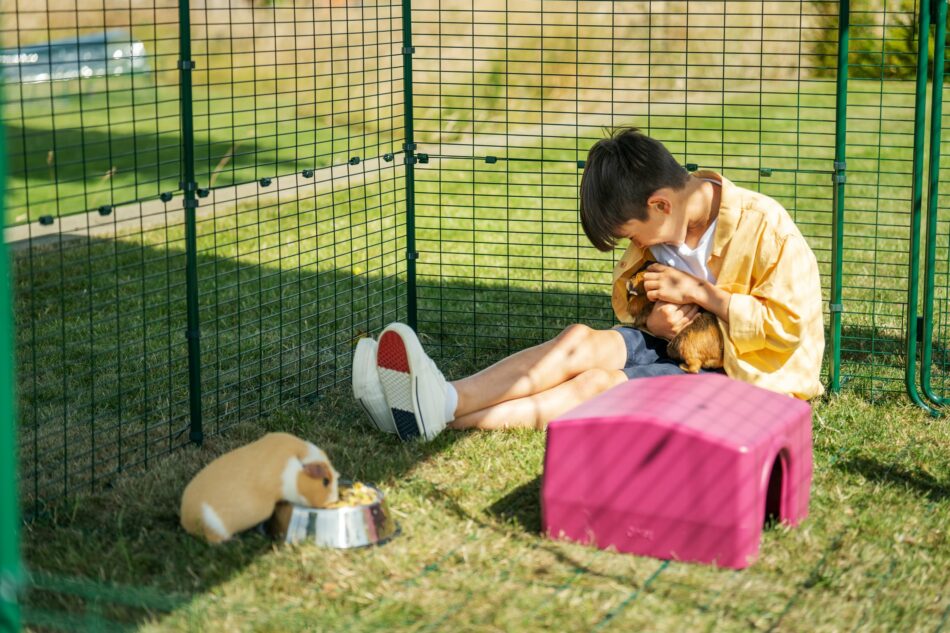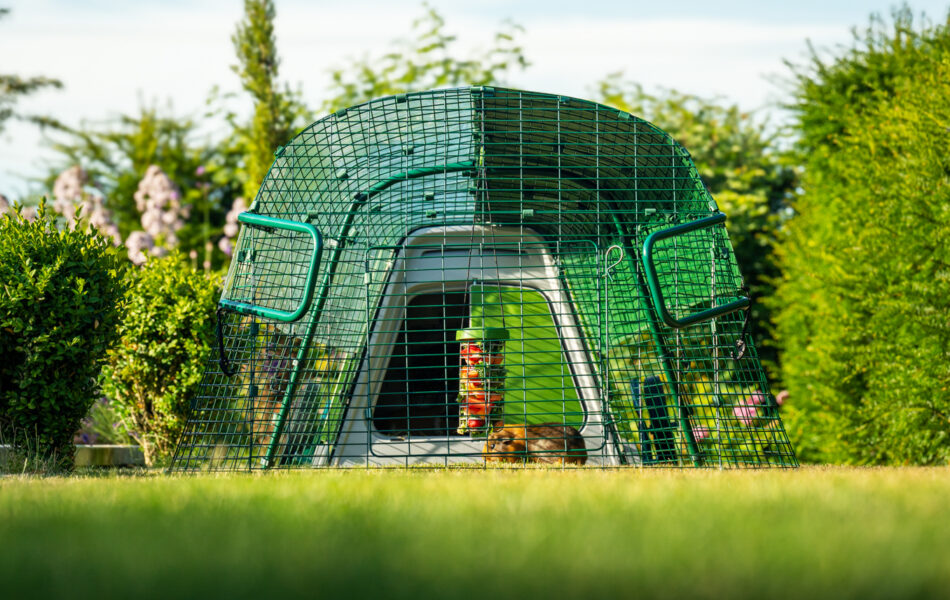Guinea pig care 101
Thinking about adding a small, sociable pet to your family? Consider cavies — aka guinea pigs — as a fun, gentle pet that the whole family can enjoy. Learn everything you need to know about them in guinea pig care 101. From their care to understanding their behaviors, here’s the scoop on keeping guinea pigs healthy and happy and how to create cavy companionship that will last a lifetime.
What to expect with guinea pigs
Guinea pigs are known for their sweet temperaments and social nature, and come in a variety of cavy coat textures and colors. But like all pets, guinea pigs have their own unique personalities. From diet and housing to health and hygiene, understanding their core needs will set the foundation for a rewarding bond.
Guinea pigs as pets
There’s no doubt about it: cavies are captivating. From their unique vocalizations to their adorable appearance, guinea pigs can bring years of enjoyment to families. Guinea pigs are members of the rodent family, and are active, personable, and entertaining to have as companions. They thrive in pairs or small groups — a single guinea pig should never be kept alone. Children can care for cavies with the help of adults, and most guinea pigs are receptive to being gently handled.
Cavies communicate through a range of sounds. This guinea pig language can range from excited squeaks — or “wheeks” — to low rumbles and soft chattering. They’ll quickly learn to associate you with food and attention, and most guinea pigs will welcome their owners with a series of sounds from their repertoire.
They’re best for people who can spend time each day offering gentle interaction and basic care. While they may be more sturdy than other rodents, they require a steady hand and calm environment to feel safe.
Diet
A healthy guinea pig diet is centered around one key element: hay — and lots of it. Unlimited fresh hay is essential for their digestion and for keeping their ever-growing teeth in check.
A balanced guinea pig diet includes:
- Unlimited fresh grass
- Unlimited hay (timothy hay for adults; alfalfa for younger cavies).
- Daily vegetables and leafy greens like romaine, bell peppers, carrot tops, or cucumber.
- Pellets fortified with Vitamin C (guinea pigs cannot produce their own)
- Fresh water, refreshed daily.
Fruits can be offered only as occasional treats, and sugary or starchy foods should be avoided. Be cautious with iceberg lettuce, which offers little nutritional value, and vegetables high in oxalates like spinach or parsley in large quantities.
Housing
Cavies need more space than many people realize. They are active animals that enjoy running, hiding, and socializing with their enclosure mates. Cramped, traditional guinea pig cages lead to boredom and health issues like obesity or illness.
Ideal guinea pig housing includes:
- An insulated guinea pig hutch
- A secure guinea pig run
- Tunnels, hides, and chew toys to keep them stimulated
- Weather covers
Most guinea pigs do remarkably well when housed outdoors. However, certain breeds like Skinny Pigs should be housed indoors since they don’t have hair to help regulate their body temperature. Peruvians are another guinea pig breed that should be monitored closely outdoors due to their long coats.
You’ll need to spot clean your guinea pigs’ hutch daily to keep it fresh — and thoroughly clean their hutch weekly by replacing the bedding, wiping or spraying the smooth surfaces clean, and cleaning their bowls and toys. Choose a soft, absorbent bedding to keep dust and odors down, and to support good sleep.
Social needs
Unlike their rodent cousin the hamster, guinea pigs should never be housed alone. Cavies are highly social and should always be kept in pairs or small groups. A bonded pair of the same sex or a neutered male with a female are the most successful pairings. Their interactions provide comfort, stimulation, and emotional security.
While they enjoy human interaction, guinea pigs can be shy at first. Gentle, consistent handling helps build trust. Talk to them softly, move slovenly, and offer food by hand to reinforce positive experiences.
Health care
Guinea pigs are relatively hardy, but they do have some unique health considerations. Regular observation is key — many illnesses can be subtle until they become serious.
Here are some signs that point to illness in guinea pigs:
- Changes in eating or drinking habits
- Weight loss or lethargy
- Discharge from the eyes or nose
- Limping, bloating, or labored breathing
- Overgrown teeth or drooling (indicative of dental issues)
Routine vet visits with a cavy-savvy veterinarian are helpful in keeping your guinea pigs healthy and happy. Nail trimming, grooming (for long-haired breeds), and checking for external parasites like lice or fleas should be part of your care routine.
It’s also important to be sure that your guinea pigs are getting enough Vitamin C, as deficiencies can lead to scurvy — a common, but preventable issue. Most commercially bought guinea pig feed is fortified with Vitamin C, but check the ingredients to be sure, and work with your veterinarian to see if your cavies need additional supplementation.
Other considerations
While not necessarily a necessity, accessories can elevate your guinea pigs’ — and your — experience. Consider adding these fun and engaging elements to your cavies’ setup:
- Zippi Guinea Pig Tunnel System
- Caddi Guinea Pig Treat Holder
- Zippi Guinea Pig Platforms and Ramps
- Zippi Guinea Pig Playpens
- Zippi Guinea Pig Shelters
These accessories have been designed to foster natural behaviors of guinea pigs, and provide endless opportunities for exercise and excitement.
Omlet and your rabbits
At Omlet, we believe your guinea pigs’ habitat should be just as smart and thoughtfully designed as your own home. Our Eglu Go Guinea Pig Hutch provides a safe, easy-to-clean, and weatherproof space for outdoor cavies. Round out your setup with Zippi Guinea Pig Runs and Playpens and Zippi Guinea Pig Tunnels to provide essential enrichment that all speak to their nature. Our products — combined with your love — make it possible to care for your guinea pigs in a simple, sustainable, and supportive way for years of cavy companionship.
This entry was posted in Guinea Pigs


